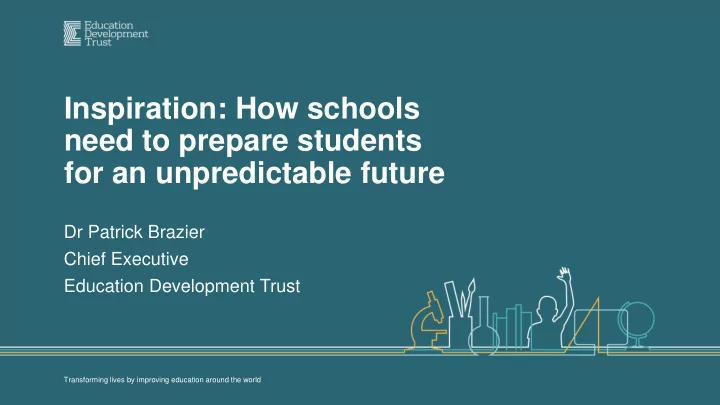

Inspiration: How schools need to prepare students for an unpredictable future Dr Patrick Brazier Chief Executive Education Development Trust Transforming lives by improving education around the world
Education Development Trust works on education reform projects worldwide
Our evidence-led expertise informs on these core areas: 1. Reforming education systems 2. School improvement 3. Careers and employability We have a longstanding commitment to supporting education reform in the Middle East and North Africa and have been working with governments here for more than 30 years
We also undertake research.
Drawing on all aspects of our corporate experience, today I ask the question: How can schools best prepare students for an unpredictable future?
Schools must have a multi-faceted response: A focus on core academic outcomes AND a broad curriculum AND the development of character and life skills; A systematic approach to work and career themes within the curriculum; Specialist careers guidance for older secondary school students.
Student life chances and future earnings depend on cognitive learning in literacy, numeracy and scientific understanding . These foundations are a precondition of an agile and effective workforce. Engaging pedagogical methods are required to ensure students are proficient in these core skills.
Whilst doing well in maths and literacy tests is a core foundation, it is not enough. 21 st century jobs will also require: Workplace competencies such as creativity and teamwork Key character qualities such as resilience and initiative Core academics only take you so far: students need a rich broad curriculum to develop talents, self-esteem and life skills.
The World Economic Forum published a report analysing the different components of 21 st century skills: …and so are Core skills are important… life skills
The good news is that we know that competencies and character qualities can be taught. Outstanding schools have for a long time recognised that academic excellence is important but it is not enough. We need to teach children to be resilient and to develop skills such as teamwork and leadership.
Multiple benefits Schools that explicitly emphasise Social and Emotional Learning within the curriculum are likely to see benefits in more than just life skills. Strong research evidence indicates students benefit in terms of greater academic achievement , as well as the positive effects on their life skill development and their wellbeing . Social and Emotional Learning Positive Academic Development achievements wellbeing of life skills
The evidence is compelling. To be effective as future workers students need: core academic skills AND a rich curriculum AND a developed character But - success in the future workplace also depends upon students’ ability to make smart, ambitious, realistic choices about careers .
In 2016 a small experiment took place with a mixed class of 5-7 year old boys and girls in a school in England. The children were asked in turn, to draw pictures of a firefighter, a surgeon and a pilot. The experiment was filmed and 25 million people have watched this online.
They drew 66 pictures: 61 depicted men and only 5 showed women . Half the class were girls but only one of them chose to show the firefighter as a woman. How do we help and encourage teachers to teach primary children… • That women can do many jobs traditionally associated with men. • And to generate ambition and aspiration for talented students from all backgrounds.
The importance of primary years Young children in primary years education should: Find out about the world of work Have a curriculum that emphasises the vast range of possibilities open to them, challenges stereotypes and helps to keep their options open for as long as possible .
Secondary schools need to provide a comprehensive careers curriculum . When students are aged 13-18 they make life-changing choices. Schools have a responsibility to make sure that these are educated choices.
Subject teachers explain about subject-related careers. STEM teachers have a particular responsibility to promote scientific careers.
Students need access to comprehensive technology-enabled information about different occupations. This school intranet gives students detailed careers guidance, including up-to-date Labour Market Information.
Representatives of different professions and employer organisations should be regular visitors to schools. At this school ‘careers fair’ students have a chance to interview professionals from many varied occupations.
Students need to receive coaching on key transition skills such as interview technique and CV writing. Here community volunteers run practice job interviews.
School students are given opportunities to visit different universities to ‘get a taste’ of college life.
Work experience - short work-based internships – should be an entitlement for students. Schools need to help students from all backgrounds to experience work in areas where they have no family connections.
All students should receive one-to-one guidance interviews with trained specialist staff.
Brampton Manor School is in Newham, one of the poorest parts of London. Half of all students get a free lunch because of family poverty. This government school takes careers education particularly seriously.
Brampton Manor insists that clever, disadvantaged students should have the highest possible aspirations. Students are mentored by volunteers from leading law and accountancy firms. In Year 12 there is a special job experience programme for girls in technology. Students considering medicine are mentored by a leading consultant physician.
In January 2019 the school announced, to the astonishment of the world, that 41 students in Year 13 had won places at Oxford or Cambridge. This was more than any other school in England except for Eton College.
The Brampton Manor story is inspirational. It shows how great teaching and a great careers education curriculum can transform life chances.
Recommend
More recommend